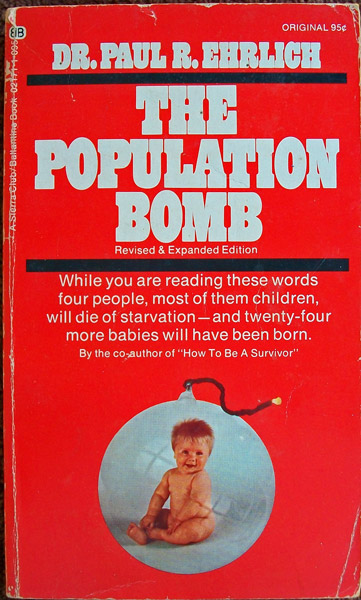 In 1968, biologist Paul Ehrlich achieved infamy by publishing The Population Bomb, one of the most controversial eco-books ever printed. Ehrlich has been condemned to spend eternity with Thomas Malthus, in a dungeon reserved for doom perverts. To this day, professors still use the two lads as great reasons to never take seriously anyone who asserts that there are limits to growth. We all know, of course, that humankind has no limits. We have technology!
In 1968, biologist Paul Ehrlich achieved infamy by publishing The Population Bomb, one of the most controversial eco-books ever printed. Ehrlich has been condemned to spend eternity with Thomas Malthus, in a dungeon reserved for doom perverts. To this day, professors still use the two lads as great reasons to never take seriously anyone who asserts that there are limits to growth. We all know, of course, that humankind has no limits. We have technology!
Actually, Malthus never predicted catastrophic famine. He simply stated the obvious — when population reaches overshoot, the death rate will automatically rise to restore balance, one way or another (starvation, disease, conflict). A thousand people cannot prosper if forced to share ten cheeseburgers a day. The overshoot ceiling rises when food is abundant, and falls when food is scarce. Malthus was not a doomer. His cardinal sin was declaring the obvious — that there are limits to growth.
Ehrlich, on the other hand, actually did predict catastrophic famine, and soon. The first lines in his book are, “The battle to feed all of humanity is over. In the 1970s and 1980s hundreds of millions of people will starve to death in spite of any crash programs embarked upon now.” Millions indeed starved, but not hundreds of millions. Everyone agrees that this prediction was inaccurate or premature.
When Ehrlich was writing, India was sliding toward catastrophic famine. Only ten nations produced more food than they consumed in 1966. In America, the postwar baby boom led to a freakish population spike of 55 million in 20 years. The streets of 1968 were jammed with scruffy rebels protesting the Vietnam War, and our totally unhip way of life. It was hip to be loud, brash, and vigorously opposed to the status quo.
At the same time, the Green Revolution was just getting rolling, and no one could foresee how well it would succeed at temporarily boosting grain production. Norman Borlaug was the wizard of the Green Revolution, and his holy mission was to reduce world hunger. He hoped that the new technology would give us 10 or 20 years to resolve our population issues. We didn’t even try. Those who recommend strict population control measures are called callous. But the leaders who irresponsibly blew off an amazing opportunity were also callous.

Naturally, much more food led to many more people. In 1968, there were 3.5 billion people, by late this morning there were 7.2 billion. World hunger sharply increased, and many other problems worsened. The Green Revolution had wonderful intentions, but its unintended consequences far exceeded its benefits, because we refused to seize the opportunity to confront and subdue the 800-pound gorilla.
The bottom line here is that Ehrlich’s predictions of catastrophe within a specific timeframe were wrong, but he succeeded in bringing a lot of attention to real and growing problems — population, pollution, and environmental destruction. At the same time, he succeeded at pissing off almost everyone.
Liberals hated him because he wanted to set population goals for poor nations, and withhold food aid for those who did not meet their goals. He contemplated the notion of withholding food aid to nations that had zero chance of becoming self-sufficient. He did not endorse the “right” of families to breed as they pleased — a right that was not handcuffed to responsibilities.
Religious people hated him because he believed that contraception and abortion should be legal everywhere, and that all children should receive rigorous training in sex education and family planning. They hated him because he believed that fetuses were nothing more than potential humans.
Environmentalists hated him, because he was a lightning rod for criticism. They believe that his fondness for bold statements made it hard for folks to trust anything that greens said. He was a popular scapegoat to blame their failures on. If Ehrlich had never been born, would we be living in a sustainable utopia today?
Conservatives hated him because he wanted to regulate pollution and pesticide use. He advocated compulsory population control, because voluntary family planning has never been successful at stabilizing or reducing population. Ehrlich detested their insane obsession with perpetual economic growth, which thrived on population growth, and disregarded ecocide. But they loved him for being so loud and so bizarre. He made it easy for them to label all greens as hysterical nutjobs.
Modern society is suffocating in information. Everyone in a hunter-gatherer clan knew the entire collection of their cultural information. Today, we don’t know a millionth of our cultural information, because knowing it all is impossible. So, climatologists are freaked out about rising temperatures, while the masses are blissfully ignorant. Petroleum geologists are freaked out about the looming specter of Peak Energy, while the masses are not.
Within the realm of his specialty, Ehrlich could perceive enormous threats that society was unaware of, and this freaked him out. He was compelled to rattle cages. If he had written a dry, mature, scholarly discourse on population, with 300 footnotes, it would not have reached a general audience and provoked lively and widespread discussion. In modern society, suffocating in information, you get attention by flaming and screaming, like the election ads for candidates. Whether or not it is honorable, it works. In my opinion, Ehrlich’s opinions were sincere, and a bit inflamed, but not devious fabrications.
Ehrlich’s book was read by many, and it drew needed attention to a crucial issue. A taboo subject was let out of the closet, for a while. Others were inspired to write books. Green organizations boldly called for action, but many checkbook activists promptly revolted by putting away their checkbooks. So, the issue of overpopulation was handed over to Big Mama Nature to resolve, and she will.

While his ideas continue to outrage many, they do have a basis in cold, hard reason. We could reward couples who don’t marry until 25, and those who space their children at least five years apart. Childfree people could be eligible to win lottery prizes. “There has been little effective criticism of the medical profession or the government for their preoccupation with death control… death control in the absence of birth control is self-defeating.” [Ehrlich in The Population Bomb]
It would have been cool if humans were purely rational, realized their mistake, and took bold action to divert disaster. Ehrlich sighed. “By now you are probably fed up with this discussion. Americans will do none of these things, you say. Well, I’m inclined to agree.” He wrote because there was a wee chance for success.
Don’t read this book to learn about overpopulation and its side effects. Hundreds of newer books are far more up to date. Read this book to contemplate morals, ethics, taboos, ideologies, and communication. Contemplate his critics, and why they are so determined to banish discussion on an issue that is a major threat to humankind and the planet (see the reader comments on Amazon.com). The anger and pain that continues to swirl around this book provides a fascinating study in human nature — long-term survival vs. a mentally unstable culture.
Ehrlich is an intelligent and charismatic fellow. In 2008, on the fortieth anniversary of The Population Bomb, he reread his book and blushed a bit. He had learned a few new things in the preceding forty years, but his overall impression was that in 1968 he had been far too optimistic. He presented his current perspective in a lecture at Stanford, From the Population Bomb to the Dominant Animal (54 min.).
* * * * *
Ehrlich, Paul R., The Population Bomb, Ballantine, New York, 1968.
Other reviews on population-related books: The Ostrich Factor, The Coming Famine, The Rapid Growth of Human Populations 1750-2000, Living Within Limits, Old Fashioned Family Planning.
* * * * *
Richard Adrian Reese's work appeared in Culture Change previously with Wild: What Is Sustainable
Done with Math is a spicy article on population growth and overpopulation by Albert Bates on Culture Change, 2012.

Reese's book What is Sustainable has a review at Amazon.com where it can be purchased.


